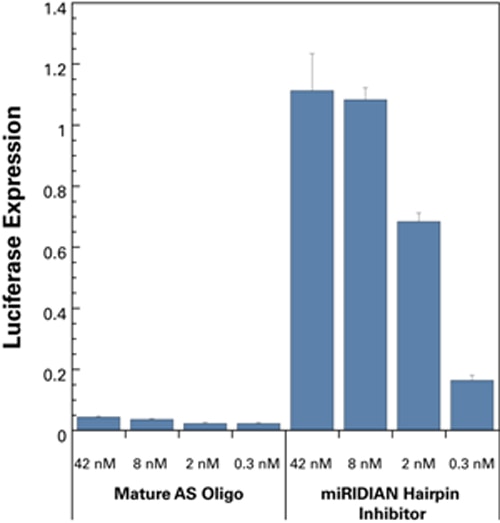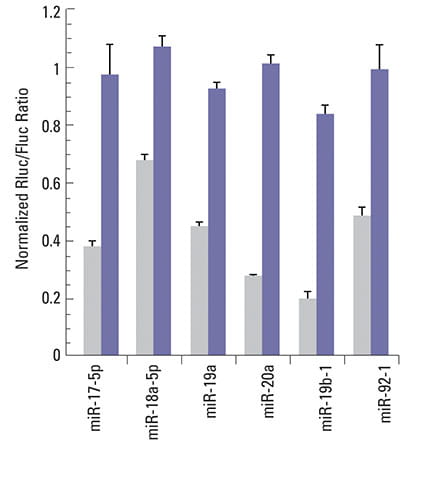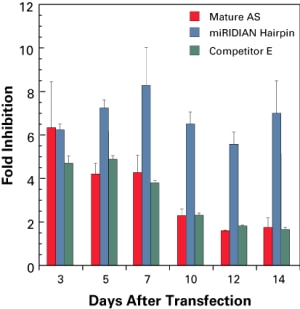Alias
Suppress endogenous microRNA activity for loss-of-function studies

Alias
miRIDIAN microRNA Hairpin Inhibitors are the newest generation proprietary, synthetic inhibitors targeting all human, mouse, and rat microRNAs in the miRBase database release 21.0. miRIDIAN Hairpin Inhibitors are single-strand, chemically-enhanced RNA oligonucleotides designed to bind and to sequester the complimentary, mature microRNA strand. Our proprietary inhibitor design allows for microRNA inhibition to be maintained longer than with any other synthetic inhibitor available on the market today.
A complete portfolio of positive and negative experimental controls to optimize conditions and design relevant microRNA modulation experiments. Critical to any successful microRNA modulation experiment, the right controls enable accurate interpretation for reliable results. Fluorescently labeled controls are also available for visual tracking.
Choose from our collection of validated positive and negative Hairpin Inhibitor controls for use in human, mouse or rat.
| miRIDIAN microRNA Hairpin Inhibitor Positive Controls | Species | Catalog Number |
|---|---|---|
| miRIDIAN microRNA Hairpin Inhibitor Positive Control | Human, Mouse, Rat | IP-004000-01 |
| miRIDIAN Hairpin Inhibitor Negative Control Reagents | Species | Catalog Number |
| miRIDIAN microRNA Hairpin Inhibitor Negative Control #1 | Human, Mouse, Rat | IN-001005-01 |
| miRIDIAN microRNA Hairpin Inhibitor Negative Control #2 | Human, Mouse, Rat | IN-002005-01 |
| miRIDIAN Transfection Control Reagents | Species | Catalog Number |
| miRIDIAN microRNA Hairpin Inhibitor Transfection Control with Cy3 | Human, Mouse, Rat | IP-004500-01 |

Figure 1. | microRNA Hairpin Inhibitor function for miR-21 miRNA was assayed in HeLa cells, 48 h after transfection using a dual-luciferase reporter system. Each sample was normalized to matching treatment using an empty dual-luciferase reporter.

Figure 3. | Six co-expressed microRNAs (mir-17-5p, miR-18a-5p, miR-19a, miR-20, miR-19b-1 and miR-92-1) from the "Cancer Cluster" were inhibited by miRIDIAN Hairpin Inhibitors. All six miRIDIAN Hairpin Inhibitors were pooled together for a 0.8 nM total inhibitor concentration. Pools were co-transfected with DharmaFECT Duo into HeLa cells with one of six reporter plasmids specific for each microRNA. Data were normalized to similarly treated empty reporter plasmid only.

Figure 2. | Time course of inhibition by three different inhibitor molecule designs targeting endogenous miR-23 in an MCF-7 cell line engineered to stably express a miR 23 dual-luciferase reporter. Inhibitors were transfected using DharmaFECT 1 at 200 nM of the simple mature antisense oligo (AS) or 40 nM of miRIDIAN Hairpin and Competitor E inhibitor designs. Data was normalized to cells with no inhibitor, such that no inhibition is equal to 1.
The miRIDIAN microRNA Hairpin Inhibitor Library is a complete collection of microRNA inhibitors arrayed in 96-well plates to allow high-throughput phenotypic screening applications in human, mouse, or rat.
miRIDIAN microRNA Hairpin Inhibitor Positive Control targets miR-16 for monitoring the effects of a microRNA inhibitor in a validated, endogenous assay, allowing for microRNA functional assays optimization and hairpin inhibitor function evaluation.
The miRIDIAN microRNA Hairpin Inhibitor Transfection Control is a Cy3-labeled microRNA Hairpin Inhibitor based on the C. elegans miRNA cel-miR-67 (miRIDIAN Hairpin Inhibitor Negative Control #1) for monitoring delivery into human, mouse, and rat cells.
Choose from two universal miRIDIAN Hairpin Inhibitor Negative Controls for experiments with miRIDIAN microRNA Hairpin Inhibitors. Negative control sequences based on C. elegans microRNAs have minimal sequence identity in human, mouse, and rat.
